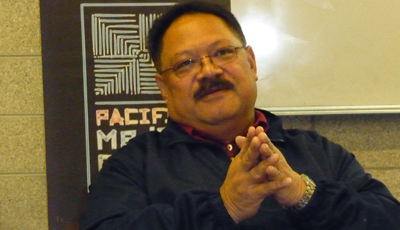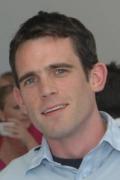
AUCKLAND: A Tongan publisher and broadcaster who is one of the driving forces behind the Pacific's new media freedom group, Kalafi Moala, believes government policies, legislation and practices will come under its microscope.
The Pasifika Media Association (PasiMA) can take “a collective stand against any infringement on media freedom”, he says.
“The story in the Pacific is that governments have always been the culprit in terms of media freedom.”
PasiMA was tentatively formed as the Pacific Media Association after mounting criticism of the long-established Pacific Islands News Association (PINA), based in Suva, Fiji.
The new body was launched last week in Apia and yesterday it changed the name to Pasifika Media Association (PasiMA) when registering the organisation.
Savea Sano Malifa, editor-in-chief of the Samoa Observer, is chair of the new organisation.
“PasiMA in Samoan means concrete fort or stronghold. That's us. As solid in conviction and in unity as a slap of concrete,” said Savea in a statement.
“The Tongan meaning is very similar,” said Moala. “We're inspired by the sense of strength and solidarity that the new name conveys.”
Rivalry with PINA
Moala also shrugged off the suggestion that PasiMA would be in direct competition with PINA, saying “the two organisations have different visions and practices, and each will hopefully fulfil what they are set up to do.”
In fact, Moala thinks that the more divergent the two bodies are the better.
“There are differences in views on almost everything - I think that's good.
“Damned be the day we all think alike about everything,” he said.
Moses Stevens, president of PINA, said “PasiMA has its own objectives and goals and so do we. I don't think our boundaries will be meeting.”
Stevens agreed that the main difference between the organisations is their approach, saying “we have different ways of doing things”.
However, Monica Miller, co-chair of the Pacific Freedom Forum (PFF), believes rivalry is inevitable.
“No matter how hard people try to prevent this, there will be some rivalry,” she said.
“I guess they will be going after the same sources of funding, and there is obviously a limit to that.”
Iulia Leilua, chair of the Auckland-based Pacific Islands Media Association (PIMA), said that the proliferation of organisations in the Pacific was “polarising the relatively small journalism communities in the Pacific which have collegial, personal or kinship relationships with the people behind these acronyms”.
Open membership
Leilua welcomed PasiMA as it had opened up membership to New Zealand Pacific media people.
“With PINA we can only be associate members as New Zealand falls outside the Pacific definition in their constitution,” Leilua said.
“We have lobbied for this to be changed without success. The policy was in place even when current members of PasiMA were leading PINA.”
Moala was critical of PINA and its stance to remain silent on media freedom issues. He believes PINA is now “under the spell of the Bainimarama regime”.
“The biggest failure is the lack of credible leadership. There are practices going on that lack good governance, transparency, and accountability,” he said.
Miller, a former president of PINA for seven years, is disappointed that the need for yet another media body has arisen. “If the [PINA] officers were not performing their duty, then why not vote them out and improve it?” she said.
However, Miller is fully supportive of the aims and objectives of PasiMA.
Presence felt
“I respect the new group and the people behind it,” she said.
“I believe they will come to the fore and make their presence felt strongly.”
Miller said it was disappointing that PINA had decided to engage with the military regime in Fiji that censors the media.
“If you are not using the very objective that you were set up for, what are you doing?” she said.
However, Stevens defended the stance that PINA has taken.
“People don't understand that Fiji is different,” he said.
“PINA wants to engage in dialogue. That is what the board is doing. We want to sit down with the government and talk with them about the importance of the media, so we can work together.”
Stevens believes it is PINA's role to highlight the importance of the media to the Bainimarama regime, which says it is working towards democratic elections in 2014.
“For the 2014 election and the democracy that ensues, we in the media need to have a major role. We need to converse with the government and get them to see that role,” he said.
Leilua believes there is certainly a need for a more independent body.
“There is always value in a group that seeks transparency, accountability and good governance within the media and our political systems,” she said.
“PasiMA has some of the most successful Pacific media people in it and they deserve our support.”
'Free of bureaucrats'
Moala says PasiMA will be able to achieve its objectives by being free of the influence of “bureaucrats” and having wide representation among
Pacific media personnel.
“The founders of PasiMA came together not just because of the PINA situation, but because they see that over the years, there has not been any media association in the Pacific that is driven by the industry itself,” he said.
“Often the industry needs are either ignored or superseded by other concerns.”
John Woods, managing editor of Cook Islands News, is the secretary-treasurer of PasiMA and resigned as vice-president of PINA in July, after criticising PINA's decision to stay in Fiji.
Miller supports the position taken by Woods.
“It is important that the secretariat of PINA is in a country not practising censorship,” she said.
“I communicate with John, as he asked for my input and I was very happy to respond.”
'New media approach'
When launching PasiMA, Moala talked about a 'new media approach' for the Pacific which he is determined to bring about. He described the new approach as one that is rooted in Pacific values.
“We need to let the things that are important to us as Pacific people be the guide to the way we tell our stories - the events, the issues, the people of our various cultures,” he said.
“It is our stories that need to be told, in our way, in accordance with our cultural view of realities that is the Pacific life.”
Miller agreed with Moala's “new media approach” saying “journalists need to do more than go after the main news stories and fill the bulletin. They have to go after stories that will impact on people's lives.”
According to the constitution of PasiMA, the objectives of the organisation also includes training for all media in the Pacific region.
Miller certainly believes the need is there: “We need to train journalists better in ethical standards, making them committed and ethical people, not affected by the lure of PR jobs that pay more money.”
She also thinks PasiMA has the opportunity to provide the public with a better education about the role of the media.
“We need to increase awareness of the role of the media. Too many see media as the enemy,” she said.
PINA also sees education as a major objective. In the case of Fiji, Stevens said: “We need to educate the people and get them to see that media freedom is their freedom.”
The newly-formed PasiMA board is now setting out a work plan that will determine its direction in the coming months. - Pacific Media Watch



